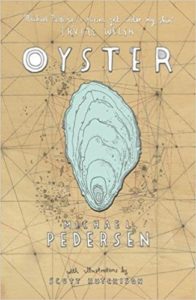
Have you told someone “I love you” with the “mechanical bareness of a warden clamping a car?” Have you felt someone’s skin zip around you? Is your moon face full like a Christmas belly? Have you read a poem about a peeping Tom, or about a conversation overheard in the dentist’s office? How about a free personality test administered by the Church of Scientology?
This is Oyster, a collection of poems by Scottish poet Michael Pedersen.
To call this collection jarring doesn’t do it justice. In fact, it’s difficult to come up with a single word of description that does it justice. Irreverent. Provoking. Odd. Disturbing. Funny. Way off. Way out. Creative. Not-like-anything-you-ever-read-before poems. The 48 individual poems often sound (when read aloud) like what you might imagine a gang of Scottish toughs to sound like, including the dialect. They sound like conversations you might imagine young men having, smoking cigarettes as they stand around barrel fires in shady parts of Glasgow or Edinburgh on a cold night.
And then Pedersen wallops you with unexpected tenderness, like in “When Carla Moved Out.”
When Carla Moved Out

no shampoo, no part of me
that you make happen, empty
shelves, cupboards bare, a soup
of snot for breakfast, a bowling
ball belly. I am glad you took
the silk pillowcase I bought you
from John Lewis. I am sad you left
flamingo slippers I ordered online
– I had to chuck them out.
Their feathers thinned, I grew
tired of sniffing them, my feet
were too bulky. When you moved
out I found another corner
of the room had got
too big for its boots, I stopped smelling
of rain and red playdough.
It’s the tenderness of loss, of remorse, articulated first in the loss of things (butter, shampoo, empty shelves, a silk pillowcase). It’s about the loss of things remaining, like old flamingo slippers falling apart from handling because they’re all that’s left to touch. It’s about a home shared that becomes too big room by room.

Michael Pedersen
Based in Edinburgh, Pedersen has received a number of prizes and fellowships, including a Cove Park Residency, the John Mather Trust Rising Star Award in 2014, and a 2015 Robert Louis Stevenson Fellowship. He has previously published a poetry collection, Play With Me (2013), and served as editor and contributor for two poetry anthologies, both published in 2015—#UntitledOne: Neu! Reekie! and #UntitledTwo: Neu! Reekie!. The illustrator for Oyster is Scott Hutchinson, the front man for the Scottish indie band Frightened Rabbit.
Oyster is a collection of poems about lives tethered and untethered, of trying to hold things together while you feel they’re coming apart. When you’re finished reading, you’re oddly moved. And moved, oddly.
Related:
The Fountain interviews Michael Pedersen on Oyster
Photo by Rowan Gillette-Fussell, Creative Commons, via Flickr. Post by Glynn Young, author of the novels Dancing Priest, and A Light Shining, and the newly published Dancing King, and Poetry at Work.
__________________________

“I require all our incoming poetry students—in the MFA I direct—to buy and read this book.”
—Jeanetta Calhoun Mish
- Poets and Poems: Beth Copeland and “I Ask the Mountain to Heal My Heart” - July 10, 2025
- A.E. Stallings: the Parthenon Marbles, Poets, and Artists - July 8, 2025
- Poets and Fables: Steven Flint and “The Sun and the Boy” - July 3, 2025
Maureen says
‘When Carla Moved Out’ is wonderful. Like any rich memory that keeps a once-beloved close, it turns on concrete details that create a marvelously visual narrative of relationship – of missing-ness and absence. How great is ‘…another corner of the room had got too big for its boots….’
Thank you for this introduction to Pedersen. No wonder he’s won awards.
Laura Lynn Brown says
What an up-and-coming guy, to get all these prizes and fellowships. What a brash and charming poem you’ve selected.
I’m seeing a poem assignment in your first line — what’s a metaphorical manner I have said “I love you” to someone, or had it said to me, or watched it said to another?
Sandra Heska King says
He seems so young to have written such a tender and image-filled poem. And yes, I nosed around Google–he’s got a whole range of words and writings. Some made me squirm a little. 😉 So talented.